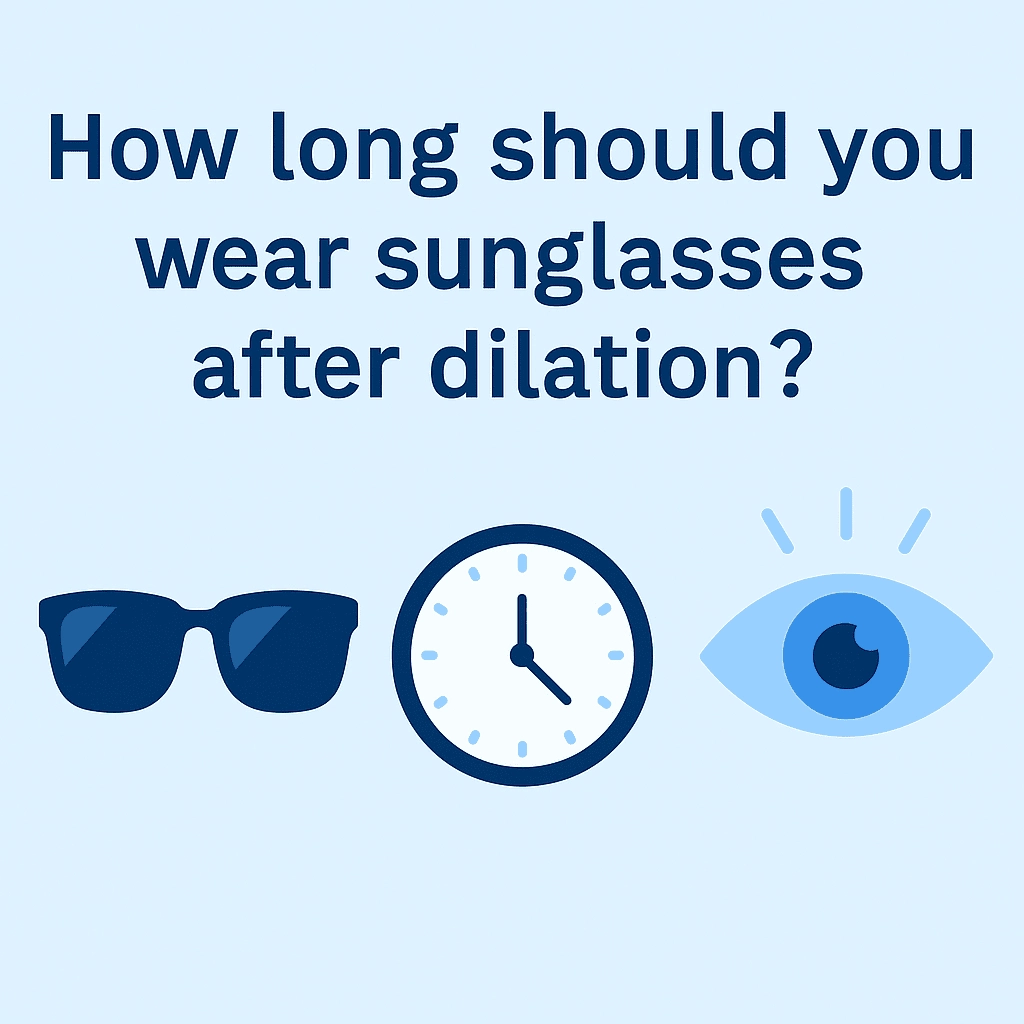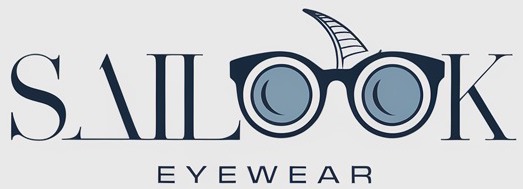Eye dilation is a necessary part of many eye exams, but it can leave your eyes feeling vulnerable to light sensitivity. You may wonder how long you need to wear sunglasses after the procedure to ensure your eyes remain protected. In this article, we will explore the importance of wearing sunglasses after dilation, how long they should be worn, and the risks of not protecting your eyes properly. Additionally, we’ll examine the types of sunglasses that offer the best protection and when you can safely stop wearing them.

1. Why Should You Wear Sunglasses After Eye Dilation?
Sunglasses after dilation aren’t just a fashion statement—they’re crucial for protecting your eyes. After dilation, the pupil remains enlarged, making your eyes much more sensitive to light. The dilation process can leave the eyes more exposed to ultraviolet (UV) radiation, which can increase the risk of eye damage over time.
But here’s the kicker: without proper protection, UV rays can cause discomfort and potentially lead to more serious issues. It’s essential to understand the importance of wearing sunglasses during the recovery period to avoid unnecessary strain or long-term damage. The brighter the light, the more likely your eyes are to feel irritation. Even if you’re indoors or in dimly lit areas, you may still experience discomfort due to the excess light that your eyes are unable to filter. Wearing sunglasses ensures that your pupils have time to return to their normal size while also preventing excess strain on your retinas.
| Factor | Importance |
|---|---|
| UV Protection | Prevents potential damage to eyes from UV exposure |
| Light Sensitivity | Reduces discomfort and strain caused by bright light |
| Recovery Time | Helps protect the eyes while they adjust back to normal size |
2. How Long Do You Need to Wear Sunglasses After Dilation?
After undergoing dilation, it’s important to keep your sunglasses on for as long as your eyes remain sensitive. The general recommendation is to wear sunglasses for at least four hours post-dilation. However, you might be wondering if that’s always the case, or if some people can remove their sunglasses sooner.
The answer depends on several factors, including the strength of the dilation drops used and your natural eye sensitivity. For most individuals, the effect of dilation will last between 3-6 hours, but in some cases, it may take longer for the pupils to return to their regular size. If you feel discomfort or excessive light sensitivity after the initial 4 hours, keep your sunglasses on. If you feel comfortable, you can gradually decrease their use.
| Duration | Sensitivity Level | Action |
|---|---|---|
| 4 hours | High sensitivity | Keep sunglasses on |
| 3-6 hours | Moderate sensitivity | Gradually decrease use |
| Over 6 hours | Ongoing discomfort | Continue wearing sunglasses |
3. What Are the Risks of Not Wearing Sunglasses After Dilation?
So, what happens if you skip the sunglasses? Here’s the deal: without the proper eye protection, you’re exposing your eyes to risks like increased sensitivity to light and long-term damage from UV radiation.
Your retinas are highly sensitive during the post-dilation period. If not shielded from bright lights, the UV rays can penetrate your eyes more deeply, potentially causing long-term damage. Additionally, skipping sunglasses can result in strain and headaches, as your eyes are forced to adjust to bright environments that they can’t handle. If left unprotected for too long, this could lead to eye discomfort, fatigue, and even problems with vision clarity.
| Risk | Consequence |
|---|---|
| UV Exposure | Potential long-term damage to the retina |
| Light Sensitivity | Immediate discomfort and visual strain |
| Eye Strain | Headaches and increased fatigue |
4. How Do Sunglasses Help After Eye Dilation?
Sunglasses play an essential role in ensuring your eyes stay comfortable and protected after dilation. What’s the real story behind their effectiveness? It’s all about shielding your eyes from harmful light sources.
First, sunglasses block out UV rays, which are known to cause damage to your retina over time. UV rays can harm the surface of your eyes, leading to conditions like cataracts or macular degeneration if left unprotected. Second, they reduce glare from bright lights, which is particularly important after dilation. The more light your eyes are exposed to, the more uncomfortable they become. By wearing sunglasses, you reduce glare and allow your eyes to heal without additional strain.
Not all sunglasses offer the same level of protection. Polarized lenses are the best option since they reduce reflections and glare, making them ideal for post-dilation recovery.
| Benefit | Description |
|---|---|
| UV Protection | Blocks harmful UV rays to prevent eye damage |
| Glare Reduction | Minimizes discomfort from bright, reflective light |
| Polarized Lenses | Ideal for reducing reflections, especially outdoors |
5. What Types of Sunglasses Should You Wear After Dilation?
Not all sunglasses are created equal. This is where it gets interesting—the best sunglasses for post-dilation care are those that block 100% of UV rays and provide adequate tinting.\
Polarized lenses are highly recommended because they minimize glare, which can make light sensitivity even worse. You should also look for sunglasses that provide full coverage, including wraparound styles. These types of sunglasses protect against light coming in from the sides, ensuring your eyes are fully shielded. The tint of the lenses matters too: darker lenses are often better for very bright environments, but if you’re indoors or in low-light conditions, lighter tints will work fine.
Make sure to choose sunglasses with proper UV protection to avoid risking your eye health during the recovery process.
| Type of Sunglasses | Benefits |
|---|---|
| Polarized | Reduces glare, ideal for outdoor settings |
| Wraparound | Provides full coverage, blocking light from all angles |
| UV Protection | Ensures 100% UV blocking to protect sensitive eyes |
6. Can You Wear Regular Sunglasses After Dilation?
While regular sunglasses might seem sufficient, they don’t always provide the level of protection needed after dilation. You might be thinking, “Aren’t regular sunglasses enough?”
The problem with standard sunglasses is that they may not block 100% of UV rays. Even if they seem dark, they might not offer full protection from the bright sunlight and glare that can cause discomfort after dilation. To be on the safe side, it’s best to wear sunglasses specifically designed for UV protection, such as polarized lenses. Regular sunglasses might offer comfort for some, but for the sake of your eye health, specialized sunglasses with UV protection are your best bet after eye dilation.
| Sunglasses Type | Protection Level |
|---|---|
| Regular Sunglasses | May not block 100% UV rays |
| Polarized Sunglasses | Blocks 100% UV, ideal for post-dilation care |
| Prescription Sunglasses | Can be effective if they provide proper UV protection |
7. Are There Alternatives to Sunglasses After Eye Dilation?
While sunglasses are the most effective solution, they’re not your only option. Ready for the good part? There are other ways to protect your eyes if sunglasses aren’t available.
A wide-brimmed hat can help shade your eyes from sunlight, especially if you’re spending time outdoors. Visors are another good option, particularly if you’re active or enjoying sports. In indoor settings, it’s a good idea to stay away from bright light sources, such as direct sunlight or harsh fluorescent lighting, by using curtains or simply staying in a darker environment. If possible, avoid spending too much time in places with high light exposure during the recovery period.
| Alternative | Benefits |
|---|---|
| Wide-brimmed Hat | Shades eyes from sunlight, good for outdoor activities |
| Visor | Shields from overhead light while keeping the face cool |
| Indoor Shade | Reduces light exposure in controlled environments |
8. What Happens If You Don’t Protect Your Eyes After Dilation?
If you choose not to protect your eyes, you could face several uncomfortable and potentially harmful consequences. What’s the risk?
The most immediate effect is discomfort caused by light sensitivity. Your eyes may feel irritated or fatigued, especially if exposed to bright lights. Long-term exposure to UV rays can lead to severe eye problems like cataracts or other forms of vision impairment. Additionally, skipping sunglasses can cause strain, making it harder to focus and causing headaches. Keeping your eyes protected during the recovery period will significantly reduce the chances of these side effects.
| Consequence | Effect |
|---|---|
| Light Sensitivity | Immediate discomfort and inability to focus |
| UV Exposure | Increased risk of long-term damage to the retina |
| Eye Strain | Headaches and fatigue from lack of protection |
9. When Can You Stop Wearing Sunglasses After Dilation?
So, when is it safe to remove your sunglasses? What’s the real story here? It depends on how your eyes feel.
After the initial 3-6 hours of dilation, if your eyes feel comfortable and no longer sensitive to light, you can begin to reduce the use of sunglasses. However, if you’re still experiencing discomfort or light sensitivity, it’s best to keep wearing them until you feel completely at ease. If in doubt, consult your eye doctor, as they can give you the best advice on when it’s safe to stop wearing them.
| Condition | Action |
|---|---|
| High Sensitivity | Continue wearing sunglasses until sensitivity subsides |
| Moderate Sensitivity | Gradually reduce usage |
| No Discomfort | Safely remove sunglasses after 3-6 hours |
10. How to Care for Your Eyes After Dilation?
Eye care after dilation is just as important as protecting your eyes with sunglasses. This is where it gets interesting—there are several steps you can take to ensure your eyes recover smoothly.
First, make sure to hydrate your eyes using artificial tears to avoid dryness. Keep your eyes moisturized, especially if you feel any discomfort or irritation. Rest your eyes frequently, particularly if you experience blurry vision or eye strain. Lastly, follow any advice given by your healthcare provider for aftercare and recovery.
| Eye Care Tip | Benefit |
|---|---|
| Artificial Tears | Keeps eyes hydrated, preventing dryness |
| Eye Rest | Reduces strain and fatigue from blurry vision |
| Professional Advice | Ensures proper recovery and comfort |
11. What Are the Most Common Symptoms After Eye Dilation?
After dilation, most people experience a few common symptoms. But here’s the kicker—they typically subside after a few hours.
The most common symptoms include blurry vision, light sensitivity, and difficulty focusing. Blurry vision is normal and should improve as the dilation wears off. Light sensitivity can be quite severe, which is why sunglasses are essential. Some individuals may also experience headaches or discomfort during the recovery period, but these symptoms are generally temporary.
| Symptom | Duration |
|---|---|
| Blurry Vision | 3-6 hours after dilation |
| Light Sensitivity | A few hours, can last longer for some |
| Headaches | Temporary, may last until dilation wears off |
12. Can You Drive After Your Eyes Have Been Dilated?
Driving after dilation is strongly discouraged. You might be wondering why? It all comes down to vision impairment and light sensitivity.
The dilation drops cause blurry vision, making it difficult to focus clearly on the road. Light sensitivity further complicates matters, as bright sunlight or headlights from oncoming traffic can cause discomfort and hinder your ability to see clearly. It’s best to arrange for transportation or wait until your vision returns to normal before driving.
| Activity | Recommendation |
|---|---|
| Driving | Avoid driving after dilation due to impaired vision |
| Walking | Safe in shaded areas but avoid bright lights |
13. How to Minimize Light Sensitivity After Dilation?
Managing light sensitivity after dilation requires a few simple strategies. Here’s the deal—the most effective way to minimize discomfort is by wearing sunglasses that block UV rays.\
Additionally, avoid bright environments whenever possible, and use curtains or sunglasses indoors. If you’re outside, try to stay in shaded areas as much as possible. For some, wearing hats with brims can provide extra protection from the sun and help shield the eyes from harsh light.
| Strategy | Benefit |
|---|---|
| Sunglasses | Blocks UV light, reduces sensitivity |
| Indoor Shade | Minimizes exposure to bright indoor lighting |
| Wide-brimmed Hat | Extra protection from sunlight |
14. What Are the Benefits of Following Post-Dilation Care?
Following proper post-dilation care can significantly speed up recovery and reduce discomfort. You might be thinking—why should I bother?
By protecting your eyes from bright light and following aftercare recommendations, you reduce the risk of long-term damage. This will lead to better outcomes for your eye exam and overall vision health. Wearing sunglasses can also make the recovery process much more comfortable, allowing you to resume your daily activities sooner.
| Post-Dilation Care | Outcome |
|---|---|
| Sunglasses Usage | Protects eyes and promotes faster recovery |
| Hydration | Reduces dryness and irritation |
| Professional Advice | Ensures optimal recovery |
15. Conclusion
To wrap it up, wearing sunglasses after eye dilation is a crucial step in protecting your eyes and ensuring a smooth recovery. Sunglasses shield your eyes from harmful UV rays, reduce light sensitivity, and prevent discomfort. Be sure to wear them for as long as your eyes remain sensitive, and always opt for high-quality sunglasses with proper UV protection. Don’t overlook the importance of post-dilation care—keeping your eyes safe today ensures better eye health in the future.
FAQ Section
- Q1: What is eye dilation?
Eye dilation is a procedure where eye drops are used to widen the pupil, allowing the eye doctor to examine the retina and other parts of the eye more clearly. - Q2: How does eye dilation affect my vision?
Eye dilation makes your pupils larger, causing blurry vision and increased sensitivity to light. This effect can last for several hours. - Q3: Can I drive after getting my eyes dilated?
It’s not recommended to drive immediately after dilation as your vision may be blurry, and you may experience light sensitivity, making driving dangerous. - Q4: How do sunglasses protect my eyes after dilation?
Sunglasses protect your eyes from harmful UV rays and reduce glare, providing comfort and preventing further strain after dilation. - Q5: When can I stop wearing sunglasses after eye dilation?
You should continue wearing sunglasses until your vision returns to normal and the sensitivity to light subsides, typically a few hours after dilation.

